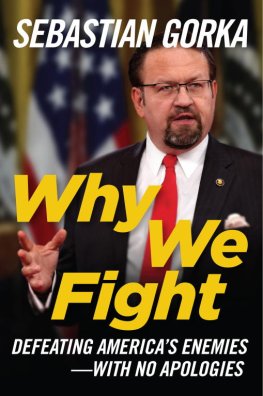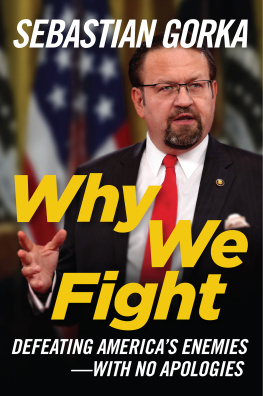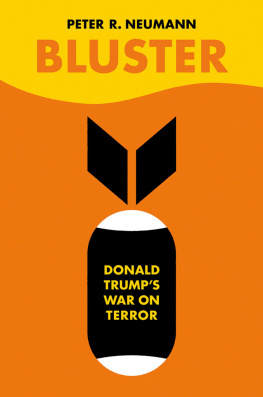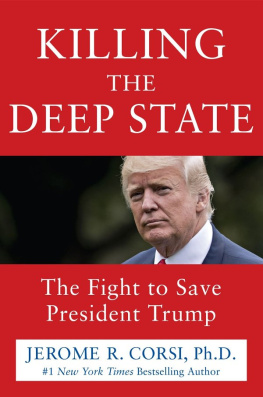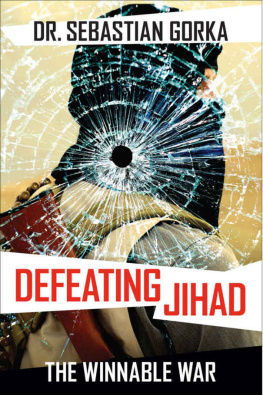Sebastian Gorka
WHY WE FIGHT
DEFEATING AMERICAS ENEMIESWITH NO APOLOGIES
To Katie, Paul, and Julia, who never lose faith in dad.
And to all those friends who stand up for the truth when it is not politically correct to do so.
Thank you:
Bruce Abramson, Jeff Ballabon, Omri Ceren, David Goldman, Ira Greenstein, Paul Packer, Judge Jeanine Pirro, Dennis Prager, Sean Hannity, Mort Klein, Liel Leibovitz, Mark Levin, Tibor Navracsics, Katie Pavlich, David Reaboi, Arthur Schwartz, Mark Steyn, and Rabbi Hershel Billet.

PROLOGUE
What It Means to Be a Freedom Fighter
The cell was cold. In the winter the only warmth came from the bodies of prisoners crammed into a tiny space designed for just two inmates, but under the new regime, housed up to a dozen.
They were awakened at six in the morning by a noise coming through the ventilation grate of the executioners team building temporary gallows in the central prison courtyard below them.
The absence of the morning reveille told everyone what was about to happen: someone was about to be killed. The question was: Who was about to be killed? Was it Bela, their brave leader?
Two inmates climbed onto the bunkbed and craned their heads toward the ventilation grate to listen. For thirty minutes, they could only hear muffled hammering and the occasional footfall. Then, silence.
Suddenly a voice, reading from the usual script, said: The President of Peoples Republic has denied the request for a stay of execution! Paul, Leslie, and Michael, who had all risked their lives to resist the communist takeover and were betrayed along with their leader, Bela, knew that there had been no request for clemency. Bela would not beg before the dictatorships lackeys.
A clear and powerful voice rang out: I die for my country! Jesus Christ, give me strength! There was a loud crack of wood slapping against wood followed by silence.
The year was 1951, and the inmate, Paul, was my father.
Born in 1930 in Budapest, Hungary, my father was formed by the experience of war. When Hitler invaded Polanda nation with centuries of ties to Hungary and many common noble familiesmy father hadnt even reached the age of ten. After the outbreak of hostilities, the government of Hungary maintained a formal neutrality. In practice, because Berlin had promised to restore to Hungary some of the territories taken from her after World War I, Budapest supported Germany and eventually declared war on both the Soviet Union and its Allies.
But by early 1944, the Regent of the kingdom of Hungary, Admiral Mikls Horthy, was no longer willing to be an accomplice to Hitlers Third Reich and the extermination of the Jews, and secretly approached the Allies to offer an armistice with his beleaguered nation. Sadly, the Hungarian initiative would never see the light of day as Hitler deployed his top commando, Otto Skorzeny, to Budapest to kidnap Horthys son and force the regent to abdicate. The Nazis then occupied Hungary and installed a puppet government of fascists calling themselves the Arrow Cross.
A country that had been the proud partner in the Austro-Hungarian Empire was now an occupied nation and a satrapy of the megalomaniac Austrian Corporal Adolf Hitler. Its once thriving Jewish community was corralled into ghettos before being murdered on the banks of the Danube or shipped in boxcars to the death camps.
This was the world of my fathers childhood: a world of war and foreign occupation which shaped the man he became.
Both my parents died long ago, but I vividly recall my fathers stories of the war years and my mothers account of the deprivation after the war; she was only six when it ended. These stories included escorting Jewish classmates who wore the Star of David on their jackets to school, protecting them from the abuse of German occupational forces. Others surrounded life after the siege of Budapest, when the invading Soviets had defeated the Nazis and took control of the country.
In 1945, my father, at the age of fifteen, was climbing through the ruins of the city with his best friend, Leslie, when a junior Soviet officer accosted them and pressed them into work. The boys were told to collect dead bodies and slide them into the basement of a bombed-out building that had been filled with lye and turned into a mass grave. When they had completed a full day of backbreaking work, the Russian officer took the boys to a field kitchen. On the way, they crossed paths with another Soviet officer who asked what was going on. When his colleague explained, the second officer began to shout and insist that the boys go back to the mass grave and work until it was full of cadavers. The two officers railed at each other until the first one pulled out his Tokarev service pistol and shot the second officer dead. He then led the boys to get their bowl of potato soup. This was a sudden and violent lesson in the value of life in Soviet culture.
By the time Hitler had been defeated, my father, having heard from his own parents about Hungary in the days of its freedom and having lived through the horrors of war on his doorstep, was praying for a rapid a return to normality. Especially after he heard of the Yalta Conference, at which the Allied leaders made a commitment that the countries of Central Europe would once again be independent and choose their own governments. But it was not to be.
In my first book, Defeating Jihad: The Winnable War, I chronicled my fathers experience after the warhis arrest by the new communist regime, the torture, imprisonment, and eventual liberation by patriotic freedom fighters in the 1956 Revolution. Allow me to explain the effect his story had on me.
Most of my fellow Americans will find it hard to relate to the background that shaped my views. Unless, perhaps, you have served overseas in the armed forces in a region still plagued by dictatorship. Even so, less than one percent of our nation serves in the armed forces, and only a fraction of those are sent overseas.
It is hard to explain the lasting effect upon me of my fathers answer to a question I asked as a young child when I noticed faint lines on his wrists. He responded, Thats where my interrogators hung me by the wrists, my hands tied together with wire behind my back from a pipe in the ceiling.
Or of walking into the rebuilt torture chamber in the basement of the erstwhile secret police headquarters in Budapest with my father, who had been brutalized there half a century earlier. I was a grown man and it was forty years since he had been tortured, but there we were in a reconstructed interrogation room where my father had been hung from pipes.
In spite of these traumatic experiences, the father I knew was always the fun one in any group. Growing up as an only child, I would watch from the top of the stairs as my parents hosted wonderful parties in our modest home in West London. My father regaled our guests so merrily that it was hard to believe he had lived through those years of horror in Nazi and then Soviet-occupied Hungary.
Susan, my mother and the daughter of a fellow political prisoner of my fathers whose only crime had been being a leader of the Hungarian YMCA, was the consummate hostess. A truly incredible cook with a formidable intellect, she taught architecture, spoke seven languages, and relished art and fine culture. My father was a simpler soul, always ready with a risqu joke or a song and a subtle yet mischievous twinkle in his eye. And all this despite the death, destruction, and betrayal that he had witnessed, as the faint scars on his wrists attested.

